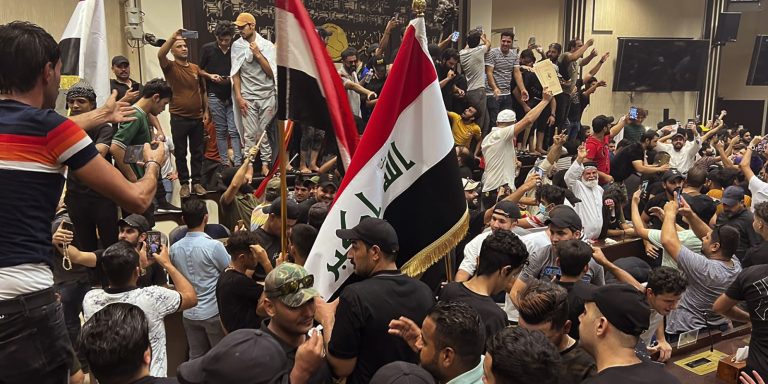INTELBRIEF
August 1, 2022
IntelBrief: Iraq’s Sadr Unleashes His Followers to Block a Pro-Iranian Government

Bottom Line up Front
- The powerful Iraqi Shia cleric Moqtada Al Sadr authorized his followers to storm Iraq’s parliament building twice in late July to protest efforts by his pro-Iranian rivals to form a government.
- Sadr’s rivals in the “Coordination Framework” have nominated an ally of former Prime Minister Nuri al-Maliki to be Prime Minister.
- Leaked comments by Maliki that strongly support Iran-backed militia factions undermined his return to the Prime Minister role.
- The likely accession of a pro-Iran figure to Iraq’s main executive post sets up a potential worst-case scenario for Washington.
The most likely scenario predicted by Iraq experts over the past few months appears to be unfolding. The popular and powerful Shia cleric Moqtada Al Sadr has unleashed protests against efforts by his pro-Iranian rivals to assemble the next Iraqi government - nearly ten months after national elections that Sadr’s faction won convincingly. The victory by the Sadrists in the October 2021 election - winning 73 out of the Iraqi parliament’s 329 seats - positioned Sadr to form a “majority government” in partnership with Sunni Arabs and Kurds and marginalizing pro-Tehran Shias for the first time since the 2003 U.S. invasion of Iraq. However, Tehran’s Iraqi partners (the “Coordination Framework”) and their allies gathered enough support (33%) to block Sadr’s coalition-building efforts. In June, Sadr withdrew his Sairoon bloc from the body and challenged his rivals to assemble a government. By late July, the Coordination Framework appeared close to success, empowered by an Iraqi law that enabled 40 of the resigned Sadrists’ seats to go to Framework candidates. On July 27, as the Framework sought to vote in a new government led by a chief executive prime minister (by longstanding accord, a Shia Muslim), and a largely ceremonial president (a Kurd), Sadrists stormed the Iraqi parliament building, preventing any vote. Thousands of Sadrists renewed their protest on July 30, storming not only the parliament but also the broader government center. Over 100 protesters were reported injured in clashes with security forces, who sought to ensure that the parliament could safely convene. Prime Minister Mustafa al-Kadhimi, the U.N. Assistance Mission - Iraq (UNAM), and several Iraqi bloc leaders appealed for calm, dialogue, and de-escalation of political tensions. The protests confirmed expectations by many experts that if his opponents were able to assemble a government, Sadr might send his supporters into the streets to demonstrate his continued commitment to democratic and majority rule and to undermine the legitimacy of any government that did not include his movement.
Sadr, as well as U.S. officials and many outside experts, assert that a government dominated by pro-Tehran factions would return to the sectarian policies that set the stage for the rise of the Islamic State (ISIS) challenge beginning in 2014. Sadr and his allies sought, in particular, to try to prevent the return to the prime ministership of Nuri al-Maliki, head of a party called State of Law, whose Iran-backed efforts to marginalize Iraq’s Sunni Arabs during his 2006-2014 rule stoked popular support for the ISIS insurgency. In an effort to undermine Maliki’s attempts to return to power, in early July, pro-Sadrists leaked audio tapes in which Maliki is overheard saying that his faction has close relations with Qais Khazali, the leader of the pro-Iran Asa'ib Ahl Al-Haq militia, and that two other Shia militias, Kata’ib Hezbollah and Sayyid Al-Shuhada are all affiliated with Iran. The tapes also cite Maliki as confirming the depths of the relations between all the pro-Iranian Iraqi factions and Iran’s Islamic Revolutionary Guard Corps (IRGC) by stating: "When I visited Iran, I spoke with the Iranian [Supreme Leader’s] advisor, Ali Akbar Velayati, the Speaker of the Shura Council, and with the information minister and...they ask that we focus our efforts with the Revolutionary Guards."
The leaked tapes were sufficiently damaging that, on July 25, the Coordination Framework chose as its candidate for prime minister not Maliki but instead Mohammed Shia al-Sudani. Even though Maliki was promoting himself, not Sudani, for the top executive slot in a Framework-dominated government, Sudani will likely work closely with him if he becomes prime minister. Sudani was a member of the Iran-backed, Shia-dominated Islamic Da’wa Party during the rule of Saddam Hussein; at the age of 10, Sudani witnessed his father and five other family members executed for membership in that party. After the 2010 election that produced his second term, Maliki appointed Sudani as Minister of Human Rights. During 2011, Sudani was briefly chairman of the “De-Ba'athification Commission” which implemented Maliki’s efforts to marginalize many Iraqi Sunni Arabs by barring individuals from government if they had links to Saddam’s ruling Ba'ath Party. Sudani served as Minister of Labor and Social Affairs during 2014-2018, in the government of Prime Minister Haydar al-Abadi.
The accession of a pro-Iran figure to Iraq’s prime ministership would set up a worst-case scenario for Washington, which has struggled for two decades to reduce Iranian influence over Iraq. As an indication of the keen interest Iran has in promoting one of its Iraqi allies, the Baghdad protests took place amid IRGC-Qods Force commander Esmail Qaani’s meetings in Baghdad, in which he strategized with the pro-Tehran factions to elect Sudani as prime minister. Should the Framework form a government, its leaders will likely respond favorably to Tehran’s insistence that Iraq ask the United States to withdraw the remaining 2,500 U.S. military personnel. The U.S. forces moved to an advisory role at the end of 2021, and Coordination Framework leaders perceive no need for continued U.S. help to suppress ISIS fighters still operating in Iraq’s remote areas. However, working to some extent in Washington’s favor, all Iraqi factions - even those aligned with Iran - resent excessive interference by Tehran. Iranian pressure on a new Iraqi government could, at the very least, fuel Sadr’s challenge to the Coordination Framework and potentially produce a long period of political agitation and possible violence.